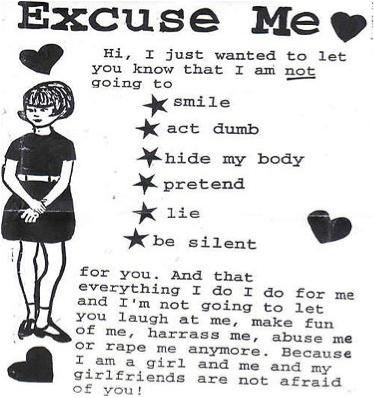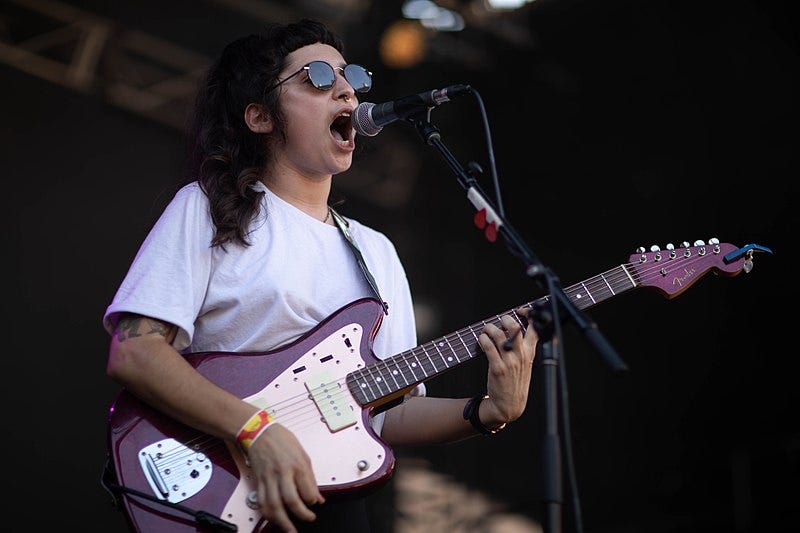Welcome back, Riot Grrrlies!
I’ll start this newsletter off with a content warning; in this installation, I’ll discuss the role of sexual trauma in Riot Grrrl. Please feel free to skip this one. I know it’s a sensitive topic. I also need to assert that I’m not writing this to be provocative; I am a rape survivor and see the merit in survivors exploring and uplifting each others’ work. Unfortunately, one of the best methods of spreading awareness and finding community is through sharing individual pain.
As you can tell from the subject of this email, Riot Grrrl took a combative approach to calling out sexual abuse. The lyrics don’t pussyfoot around; they force others in the scene to confront its realities. (If you’re not a fan of how incendiary the phrase “dead men don’t rape” is, you’ll probably want to stop reading here.)
Another disclaimer: obviously, men and other genders can be victims of sexual assault. I’d be remiss not to acknowledge that. Today, though, I’ll focus primarily on the experiences of women, namely because I am a woman and most of the pioneers of the genre identified as such, too.
Women and girls suffer the majority of attempted or completed rapes. According to RAINN, 1 in every 6 women is a victim. Age plays a factor as well — 18 through 34 year olds account for 54% of sexual assault victims. So, the demographic of people most affected by sexual violence and the frontrunners of Riot Grrrl overlap pretty heavily.
The lyrics speak for themselves. Here are a few powerfully antagonistic verses I want to highlight.
“I don't have pity not a single tear / For those who get joy from a woman's fear / I'd rather get a gun and just blow you away / Then you'll learn first hand / Dead men don't rape” (7 Year Bitch, “Dead Men Don’t Rape”)
“I just wanna manipulate my girlfriend / I just wanna play games with her head / I want her to do some mental push ups, I want her to apologize and beg / It's a sin, it's so wrong / I feel guilty as fuck” (Tribe 8, “Manipulate”)
“Don't you wanna feel it inside? / They say that it feels so nice / All girls should have a real man / Should I buy it, I don't wanna / I don't wanna join your club / I don't want your kind of love” (Sleater-Kinney, “A Real Man”)
I think the idea that violence shouldn’t combat violence is tired; when I started speaking out about sexual assault I’d endured, others told me that staying angry gives your abuser power. That’s bullshit. There’s power in being mad at abuse you endured. Allowing myself to feel rage toward the men who hurt me aided my healing process immensely.
“Dead Men Don’t Rape” perfectly encapsulates that justified rage; these lyrics show no desire to “get over it.” “Manipulate” offers a look into the mindset of an abuser who attempts to paint themselves as the victim. “A Real Man” aggrandizes the concept that angry women just need to be fucked by a “real man” to calm down. Sexual violence is rooted in patriarchy, so parodying male entitlement is a form of narrative reclamation.
It’s empowering to hear music by women who’ve been through similar traumas, especially when they allow their anger space through song. Some of these aforementioned tracks, like many Riot Grrrl anthems, offer tongue-in-cheek commentary on pretty dismal subjects. (Sexism, homophobia, capitalism, you name it and there’s probably a Riot Grrrl song parodying it.) And, to me at least, humor can oftentimes be the best coping mechanism.
Addressing gender-based anguish sarcastically through lyricism didn’t die off as the original Riot Grrrl movement weaned. One of my favorite modern-day bands, Camp Cope, is a trio from Australia. In their 2018 song “The Opener,” frontwoman Georgia Maq screams:
“All my success has got nothing to do with me / Yeah tell me again how there just / Aren't that many girls in the music scene.”
Maq chews the mantra she’s presumably heard over and over from male cohorts up and spits it back out. The song is blunt, emboldened, and biting. The final line solidifies the critique: “Just get a female opener / that’ll fill the quota.”
To me, music has always served in my healing process. I wrote a prior opinion column about this topic (shout out Berkeley Beacon, I guess); it’s specifically about the artist Jetty Bones and how her frank discussion of sexual assault made my inability to just “get over” my own experiences feel justified for the first time. (Fair warning, I wrote this at age 20 and it’s nothing spectacular.)
That’s all I’ve got for you this week. I do apologize if this felt Twitter-buzzwordy; there’s really only so many ways to say “trauma” before you start sounding like one of those threads suggesting some bananas theory like re-watching TV shows is a “trauma response.” (That’s a real thread I had the misfortune of stumbling across recently. It’s unfortunate that online lingo has devalued some words that are truly central to discussions like this one, but I digress.)
Straying a bit from 90s Riot Grrrl, this week’s album recommendation is Camp Cope’s “How to Socialise & Make Friends.”
The album has some of my favorite songs of all time; “Face of God” is another track that fits the theme of this newsletter; Maq opens up about sexual trauma and not being believed in the music scene. Other songs that’ll have you howling along with them include “Anna” and “Animal and Real.”
Take care but take no shit, Riot Grrrlies.







this might be my favorite newsletter of the series!!